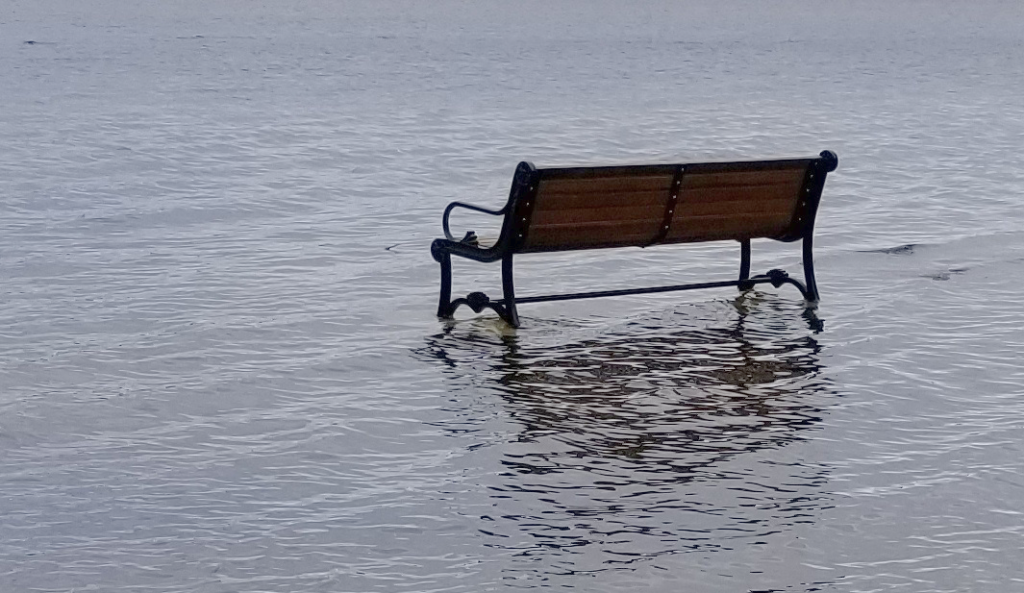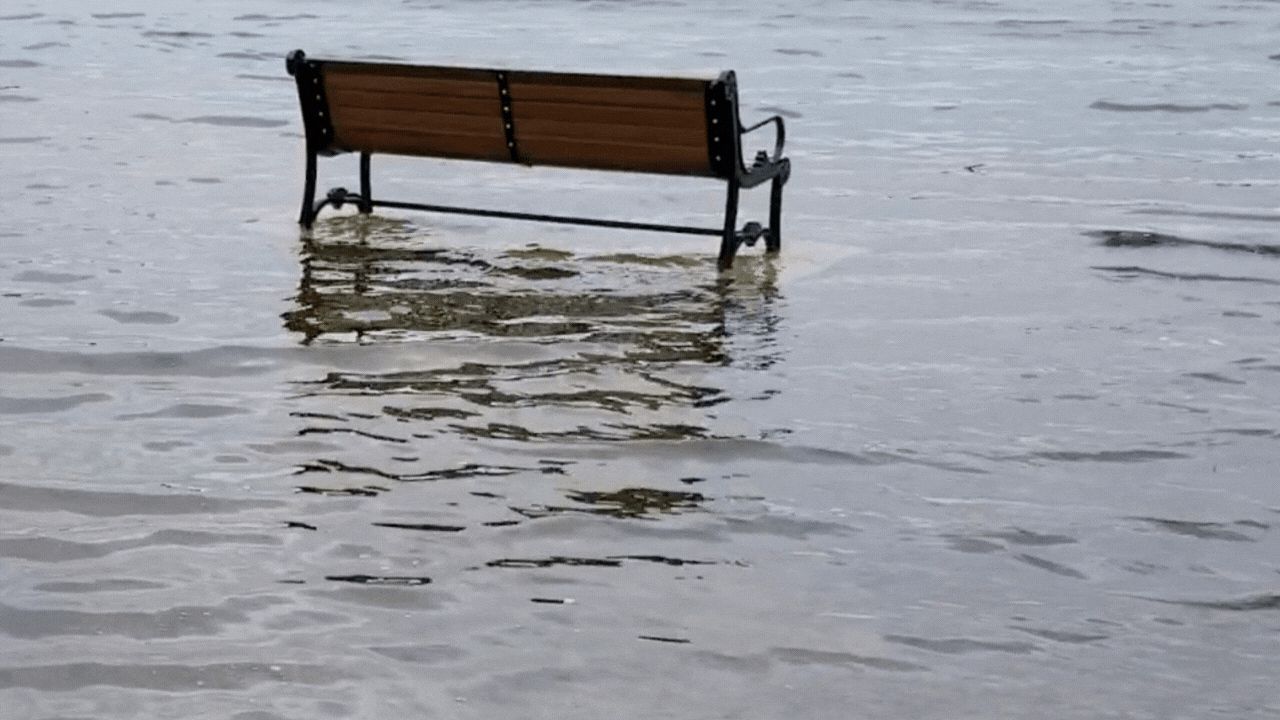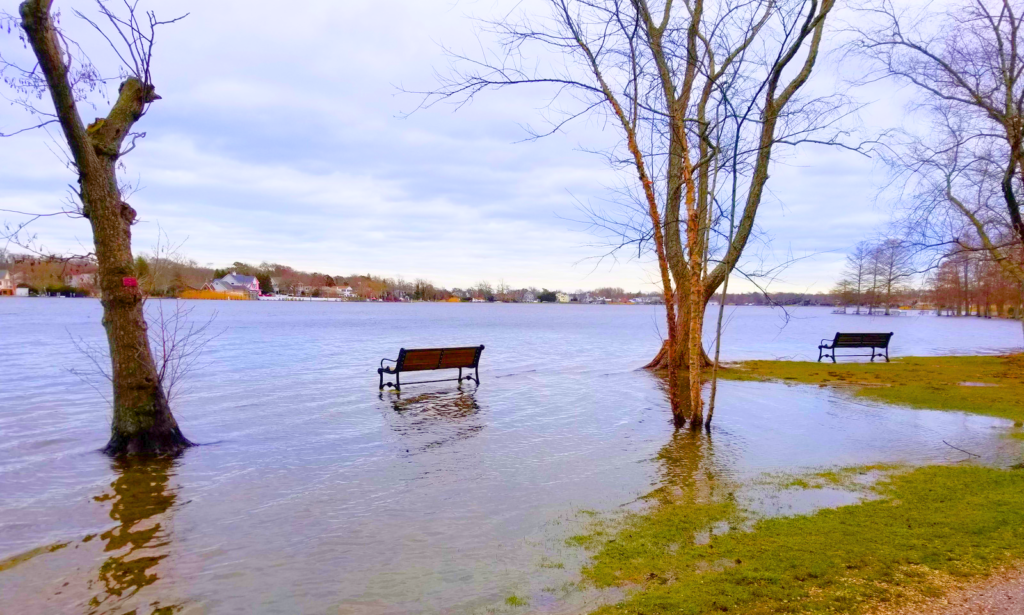
A Bench on the Water Waiting for Company
12 November 2022
Louis Vincent Balbi
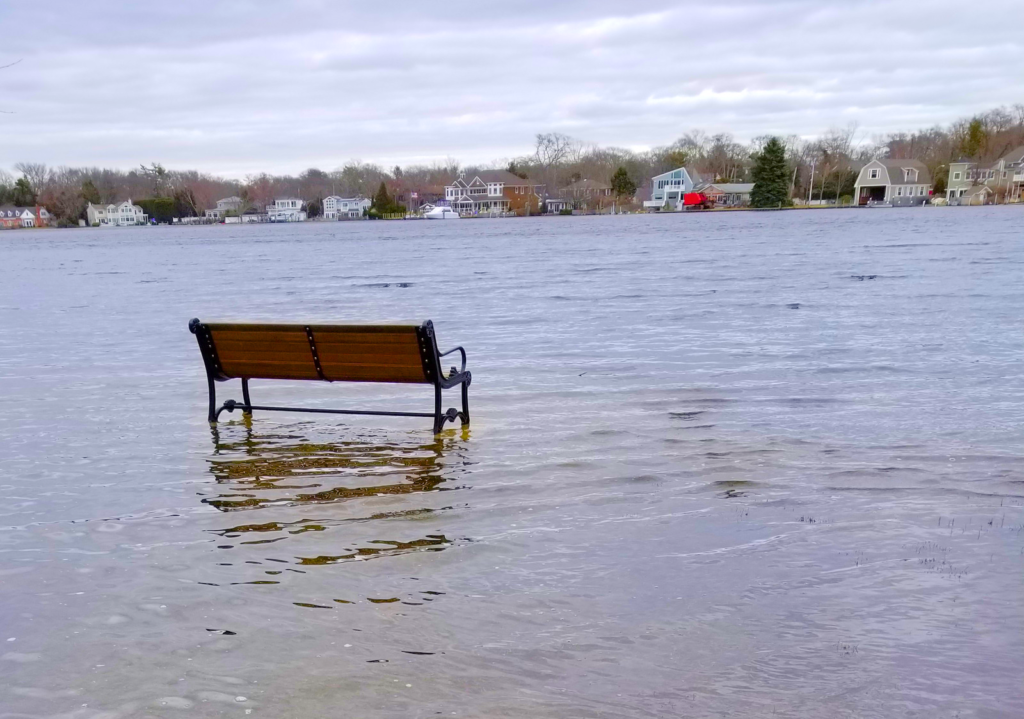
A bench in parks, fields, and woods
is a godsend for worn-out little ones
with short legs sore from keeping up
with mommy’s and daddy’s long legs.
The same for those old, slow, weary walkers
with stiff, uneven gait and wobbly, unsure step,
whose well-worn, worn-out-feeling bodies
find it hard to keep pace with their desire
to explore, walk, and hike — as they once did
without conscious effort or thought
once upon a time before their faces revealed
the roadmap of their travels through time.
Even teenagers, twenty-agers, and middle-agers
greet the sight of a bench
with a grateful smile as they sit,
pause to take in their surroundings,
inhale nature’s sweet air,
slake their thirst,
and tighten loose laces.
For all who unexpectedly come upon a bench,
it’s almost always a welcome surprise.
Even twitchy squirrels hop on and birds alight
on this unnatural, human-made structure
when bored with garden-variety rest sites.
One overcast, cool day in March, on a walk
at one of Long Island’s Arboretum Parks —
the one alongside the Connetquot River —
after heavy rains made the waters overflow
their usual bank, their normal shore borders,
I saw a startling sight:
a bench not on the path nor on the grass;
not on the ground at all,
but standing on the water.
Never seen that before
in all my years. Ever.
And so, like all memorable things
that one will never forget —
as is the modern, common custom
of this ditsy digital age —
I took photos, photos, photos.
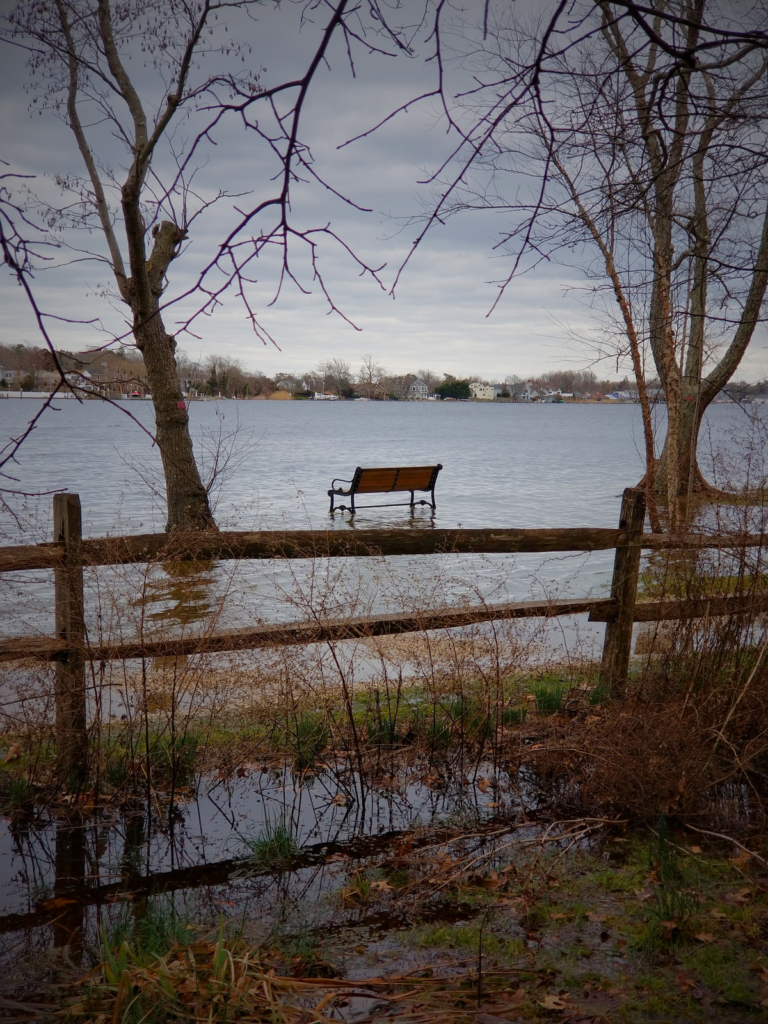
Then I wondered:
(after looking with focused eyes
to record that image in mind’s memory
rather than viewing the scene on screen)
how would it be if someone sat there?
Maybe me.
Then I imagined:
sitting out there on that bench,
ass on the hard wood, feet and ankles
submerged in cold, flowing water,
bottom of my pants legs drenched.
Feeling that imaginary chilly wetness
urged my aged bladder to release.
My astral self hurriedly left
that vivid vision
so as not to pee my pants
for there are consequences
for one’s thoughts —
of things real or imagined —
as well as one’s actions.
Then I realized:
a parked bench is one thing
but a docked bench quite another.
Seeing things not in a usual way
engenders a sense of wonder
or depth of appreciation
for things blending
into background blur
by might-as-well-be blind,
inattentive eyes.
Concrete dwellers and tourists, squinty-eyed
by years of staring at garish neon
and now victims of glaring, too-bright,
light-emitting, dancing diodes
that burn afterglow blobs in blinking eyes,
look up and see nothing but a night sky of gray haze.
One night, they may find themselves like Saul,
blinded after a ride on the road to Damascus,
who then received both sight and spirit,
if they are blessed to regain ancestral senses
out in the dark countryside where the ground
is hallowed and the grass urges taking off
sandals and shoes so that soles can be touched
and ears awed by invisible hands stroking the lips
of leaves who whisper nature’s green prayers.
And then when their nose is enticed by the spice smells
of growing things, they will hunger for something more.
Out there, those once-dim stars above their city
with an unnatural halo of light-polluted sky,
will now dramatically reveal their brilliant glory
there in that natural cathedral of dark skies
where some humans learn humility
while others see nothing but darkness
when they find themselves facing reality’s clarity,
dwarfed by distant lights afloat in a black sea.
Those who know the stars we see
are so incredibly distant that years
have passed since their sending forth
their light, understand those stars
we sight are only a memory, an image
written in time’s traveling light.
And so their visage silently testifies
when upturned, rapturous faces with mouths
agape gaze up beyond terrestrial height.
I summon to mind Louie Armstrong;
see his wide, bright smile;
hear his weathered, wise voice sing.
Indeed, what a wonderful world this is
where such amazing things exist.
An arboretum park bench patiently stands
in water waiting for someone to sit
on it to enjoy a rest and the view,
unable to understand why passersby
keep walking past, ignoring it.
But not I, for my eyes habitually scan
for out-of-place things, to take note,
and revel in wonder when fortunate
to experience such beautiful strangeness.
And now, the truth why my astral self fled
from sitting on that bench on the water.
It wasn’t that I felt the urge of impending urination
but because I felt an urge to stay and never leave,
chilling me to the bone with terrified rumination,
not from mere cold water imaginings.
Feeling another’s loneliness to that point
where it resonates in your deepest parts
like an unbearably penetrating bass sound
so loud, so arrhythmic, so irresistible
that it alters the beat of one’s heart
so that your own loneliness is amplified
is perilous because that communion
is not two lonely souls being happy
for each other’s companionship
but rather being miserable together,
imprisoned in their darkest of black spaces
like two once-valuable, precious pieces of jewelry
lost on a beach and dragged out to sea
dropping in value the farther away
from human appraisal they descend
as they sink to the solitary ocean bottom,
never to be seen again in the light
of our golden sun and eventually,
inevitably, unable to see
even each other in that dark forever.
That bench must have felt my palpable desire
to keep it company, sensed my empathy
for its imposed solitary confinement.
It must because what is the purpose
of us, the conscious stuff of dust,
if not to connect with all things
either with concern or conversation?
But unable to actually converse
with it and unwilling to remain,
I excitedly — or was it desperately — called out
to my grown son walking nearby and shared the sight
but none of my odd-duck thoughts
or feelings of its lonely plight.
Then I slowly walked away, giving them space
to get to know the other as much as they felt right.
With a final look back, I noticed something
overlooked before, something dark and broken.
Below and behind the bench, blackness rippled.
Its shadow or shattered reflection
bobbed on the water’s wavering surface,
futilely stretching out, trying to touch land.
I smiled, surprised by those hard-luck, shiny shards
of cracked, mirrored flotsam from that stranded bench.
They danced excitedly like a hope-filled, shipwrecked
sailor sighting a passing ship that might provide
welcome rescue from his lonely island’s cold-hearted
imprisonment by its barrier of barbed-iron distance.
I turned away but took everything I could carry
of that day with me. I was no longer burdened
by the weight of dark thoughts because the sight
of that bench’s reflection appeared to hold hope.
Its desolate situation might have a finite
end and that hopeful belief often offers comfort —
for even imagined hope is hope of a sort.
When all else fails, reach for imagination’s light,
for dark musings can be endured and fought
when one first imagines fighting the fight.
